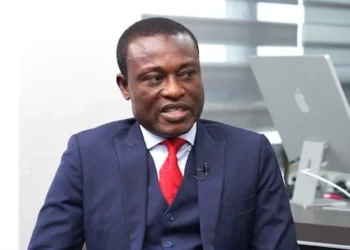The Executive Secretary of the Chamber of Petroleum Consumers (COPEC), Mr. Duncan Amoah is optimistic that fuel prices will drop within the next pricing window which is sometime within next week.
However, Mr. Amoah said that because there are many external determinants of fuel pricing, after the anticipated reduction in prices next week, COPEC is not certain that the prices will be stable or not.
“The next window for pricing is somewhere next week. We [COPEC] are hoping that prices will drop. Now what happens beyond that, we don’t know now.”
Duncan Amoah, Executive Secretary COPEC
According to the Secretary of COPEC, diesel which currently sells at GH¢23 is expected to be sold at GH¢21.19, whereas petrol may be sold for GH¢17.10 or GH¢17.00 instead of GH¢17.99.
“All things being equal, diesel could go down by GH¢2.00 a litre and petrol could go close to a cedi per litre based on the forex numbers that we have picked over the past one week,” he said.
He mentioned that the possible reduction in the prices is because Bank of Ghana (BoG) is attempting a certain mico-management of the forex. He was hopeful that should the intervention from the BoG continue, fuel prices will become stable.
“Let’s hope that it is able to continue the micro-managing then the rate is able to stabilise. If that happens then probably prices may come down.
“If that gets out of hand then unfortunately as we’ve seen, year on year, where you enter the final quarter where imports numbers shoot up, and the demand for the dollar is high, you are simply going to get an aggravated fuel pricing situation.”
Duncan Amoah, Executive Secretary COPEC
COPEC Gives Reasons for Hikes in Fuel Prices
The Executive Secretary of COPEC identified the numerous taxes on petroleum products as the main cause of the surge in fuel prices.
Even though he acknowledged the impact of international trade and the depreciation of cedi on fuel pricing, he claimed the taxes on fuel are abnormal.
“Since we went into the deregulation programme, we have grown taxes on petrol to the extent of 422%,” Mr. Amoah bemoaned.
He was bewildered about the fact that fuel prices have affected all aspects of the Ghanaian economy and yet government is unwilling to subsidise taxes on fuel which when done, will reduce fuel prices significantly.
“Unfortunately when you talk about the taxes regime being looked at, we are told that you need to pay taxes. Yes we need to pay taxes, but not when these same fuel prices is driving the cost of food, driving the cost of all other goods and services in the country to beyond affordability.”
Duncan Amoah, Executive Secretary COPEC
Mr. Amoah claimed that prices of fuel in Ghana is relatively higher than in the USA all because of the unbearable taxes on petroleum products in Ghana.
He advised government to at least review the taxes on petroleum. In his opinion when cost of living is high, then government “policy must align” with tax exemptions or subsidies.
In Mr. Amoah’s view, the National Petroleum Authority (NPA) should not be blamed for the increase in prices because, the NPA is a mere regulation body. He ultimately blamed the increase in fuel prices to poor management by government.
READ ALSO: Ofori-Atta Won’t Be Able to Convince Parliament to Approve Budget – Kwesi Pratt























